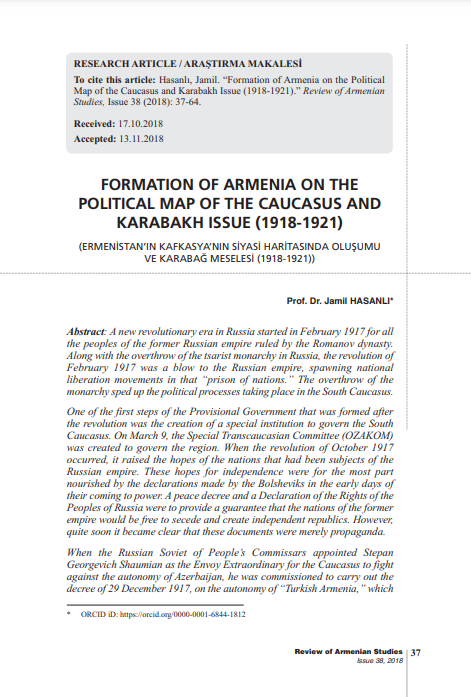FORMATION OF ARMENIA ON THE POLITICAL MAP OF THE CAUCASUS AND KARABAKH ISSUE (1918-1921)
Download PDF :


Review of Armenian Studies
Publication Date: 2018
Author: Dr. Jamil HASANLI
A new revolutionary era in Russia started in February 1917 for all the peoples of the former Russian empire ruled by the Romanov dynasty. Along with the overthrow of the tsarist monarchy in Russia, the revolution of February 1917 was a blow to the Russian empire, spawning national liberation movements in that “prison of nations.” The overthrow of the monarchy sped up the political processes taking place in the South Caucasus. One of the first steps of the Provisional Government that was formed after the revolution was the creation of a special institution to govern the South Caucasus. On March 9, the Special Transcaucasian Committee (OZAKOM) was created to govern the region. When the revolution of October 1917 occurred, it raised the hopes of the nations that had been subjects of the Russian empire. These hopes for independence were for the most part nourished by the declarations made by the Bolsheviks in the early days of their coming to power. A peace decree and a Declaration of the Rights of the Peoples of Russia were to provide a guarantee that the nations of the former empire would be free to secede and create independent republics. However, quite soon it became clear that these documents were merely propaganda. When the Russian Soviet of People’s Commissars appointed Stepan Georgevich Shaumian as the Envoy Extraordinary for the Caucasus to fight against the autonomy of Azerbaijan, he was commissioned to carry out the decree of 29 December 1917, on the autonomy of “Turkish Armenia,” which had been prepared by Joseph Stalin. The decree recognized the full independence and sovereignty of the Armenian nation in “Turkish Armenia,” which had been occupied by the Russian army. Other items were the creation of militias to protect the population of “Turkish Armenia” and their property once the Russian army withdrew from the territory; the unimpeded repatriation of Armenians who had emigrated from “Turkish Armenia”; and the creation of a provisional administration of a democratically elected Armenian national deputies’ council.
Please click here to access the article.





























